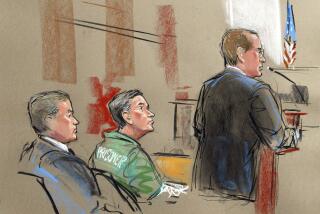Navy Radioman’s Sentence for Espionage Is Upheld
- Share via
Concurring with a judge who called him “one of the most spectacular spies of this century,” a federal appeals court Thursday upheld the espionage conviction of Jerry Whitworth, a Navy radioman who fed secret communications data to the Soviets for nearly 10 years as part of the Walker family spy ring.
In a 3-0 decision, the U.S. 9th Circuit Court of Appeals also upheld Whitworth’s 365-year sentence under which he does not become eligible for parole for 60 years.
“Espionage is one of this nation’s most serious offenses,” Judge Robert Boochever wrote in an opinion that rejected Whitworth’s challenges to a variety of evidence admitted at trial and his claims that his sentence was unduly harsh. “Viewed in the abstract, a 365-year prison term, with little prospect of parole, would appear harsh. This sentence, however, is not disproportionate to Whitworth’s crimes.”
Convicted in 1986
Whitworth, 49, was convicted in 1986 of selling classified Navy communications and cryptographic data to the Soviet Union through spy ring leader John Walker, who was himself sentenced to life in prison but will be eligible for parole for 10 years.
Whitworth’s lawyer, Alan M. Caplan, citing conflicting rulings in other circuit courts over the legality of minimum parole terms longer than 10 years, said he would appeal to the U.S. Supreme Court.
But Assistant U.S. Atty. Sanford Svetcov said Whitworth’s sentence was warranted, even though Walker, who pleaded guilty and testified against Whitworth, will become eligible for parole after serving 10 years of his life prison term.
“The difference between Walker and Whitworth was they both were spies for 15 or 20 years, but Whitworth denied it to the end, and Walker said, ‘OK, you got me, I’ll testify,’ and helped break up parts of the spy ring and provide information as to the extent of the damage,” Svetcov said.
18-Year Spy Ring
The 18-year spy ring headed by Walker with the help of his son, Michael, his brother, Arthur, and Whitworth has been described by authorities as among the most damaging in U.S. history.
According to evidence at trial, Whitworth, a radioman and later a supervisor in charge of cryptographic equipment and material, had unique access to mathematical codes used by the Navy to conceal the content of messages sent and received at sea.
Walker had been selling information to the Soviet Union for six years by the time he recruited Whitworth, his longtime friend, according to the court record. Whitworth received a total of $332,000 through Walker between February, 1975, and April, 1984, in exchange for confidential cryptographic and other communications information, which Walker relayed to Soviet agents.
Whitworth contended throughout the trial that he believed the information was being forwarded to U.S. allies.
Discretion Abused
The appeals court found that U.S. District Judge John P. Vukasin Jr. abused his discretion in admitting Walker’s statement that he suspected Whitworth knew the data was going to the Soviets because of “common sense. . . . It made no sense that a friendly government or a criminal element would buy cryptographic material.”
The court said that although Walker’s assumptions about Whitworth’s beliefs were inadmissible, they did not merit reversal of the conviction.
Similarly, the court was critical of the affidavit upon which a search warrant for Whitworth’s mobile home in Davis was obtained, but did not hold that Whitworth should have been entitled to an evidentiary hearing to challenge the warrant.
More to Read
Sign up for Essential California
The most important California stories and recommendations in your inbox every morning.
You may occasionally receive promotional content from the Los Angeles Times.









